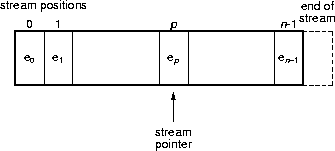
- Stream positions - these are not integers.
- Stream pointer
- The end-of-stream position.
ostream writes data into the sequence.
istream reads data from the sequence.

ostream writes data into the sequence.
istream reads data from the sequence.
ifstream - file streams that read files.
ofstream - file streams that write files.
fstream - file streams that read and write files.
<fstream> include file.
open() connects a file stream to a
file.
void open(const char fname[])
close() breaks the connection between a
file stream and a file.
void close(void)
void write(const char data[], int data_size).
data_size bytes from data into the file stream.
void read(char data[], int data_size).
data_size bytes from the file stream into data.
bool eof(void) stream member function returns true at eof,
false otherwise.
while (!inf.eof()) inf.read(data, data_size);
while (true) {
inf.read(data, data_size);
if (inf.eof()) break;
}
int gcount(void) returns the number of
bytes last read.
>>) and insertion (<<).
istream & operator >> (istream &, T &)
ostream & operator << (ostream &, const T &)
cout << "i = " << i << "\n"
cin >> x >> y >> z;
cin hits eof, it returns NULL.
while (cin >> i) { ... }
outs << value.
outs is an io stream opened for writing
value is a value of a type the insertion operator knows how to
convert (int, char, string and so on).
value is converted into characters
ins >> var.
ins is an io stream opened for reading.
var is a variable having a type the extraction operator knows
how to convert.
'0' through
'9' possibly proceeded by either '-' or
'+'; all the digits are read, but not necessarily used.
var.
eof, the end-of-file condition has been detected.
fail, non-fatal i-o error, usually a format error.
bad, a fatal error; undefined state.
bool eof(void), and so on.
clear() member function.
bool good(void) - true if no errors; false otherwise
ifstream inf; const string fname = "my.dat"; inf.open(fname.c_str()); if (!inf.good()) cerr << "Can't open " << fname << "\n";
inf.read(data, data_size);
if (inf.eof()) { /* eof error */ }
if (!inf.good()) { /* other read error */ }
bool operator!(stream) returns true if there are no errors
operator! doesn't consider eof an error
ifstream inf;
const string fname = "my.dat";
inf.open(fname.c_str());
if (!inf) { /* Open error */ }
good() over operator!.
while (cin >> x) { ... }?
void * pointer.
void * pointer gets converted to a boolean.
istream ins("file.dat");
if (!ins) { /* Open error */ }
fail error.
var does not receive a value.
good() returns false.
open() describes how the file should be
opened.
ios::in - open for reading, file pointer at the beginning of the
file
ios::out - open for writing, file pointer at the beginning of
the file; this trashes the previous file contents
ios::app - open for writing (appending), file pointer at the end
of the file; this preserves the previous contents of the file
ifstreams is ios::in.
ofstreams is ios::out - the default open
for writes is destructive.
fstreams have no defaults - you must specify ios::in,
ios::out, or ios::in + ios::out
open().
ifstream inf("my.dat");
void put(char) file stream member function.
int get(void) file stream member function.
istream getline(istream, string, char) function.
<string>, not in the stream includes.
<iomanip>.
hex, dec, oct.
int i = 135 ; cout << i << " in hex is " << hex << i << "\n"
cout << "Input a hex number: " ; cin >> hex >> i
setbase(i) manipulator where i = 8, 10, or 16.
setw(i).
i characters to format.
cout << setw(5) << 3 produces " 3"
cout << setw(1) << 123 produces "123"
setw() is not sticky
cout << setw(4) << "a" << "b" produces " ab"
cout << setw(4) << "a" << setw(4) << "b" produces " a b"
setfill(c) manipulator - use character c as the pad.
cout << setw(5) << setfill('*') << 1 produces "****1"
setfill() is sticky
setiosflags() manipulator - modify control bits
ios::left - left justify output; "1 "
ios::right - right justify output; " 1"
ios::showpoint - output floating point with a dot and zeros
ios::skipws - skip whitespace on input; also the ws
manipulator; this usually doesn't do what you want
ios::scientific - output floating point in scientific notation;
also(ios::fixed
ios::uppercase - output uppercase hex digits; also ios::lowercase
resetiosflags() manipulator
setw() manipulator and the width() stream member
function.
setfill() manipulator and the fill() stream member
function.
setiosflags() manipulator and the setf() stream member
function - also unsetf().
endl - output a newline.
flush - force output.
std::ios::pos_type tellg(void) and std::ios::pos_type
tellp(void)
istream seekg(pos_type) and ostream seekp(pos_type)
reposition the file pointer as indicated.
istream seekg(off_type seek_dir) and ostream seekp(off_type,
seek_dir) reposition the file pointer relative to the indicated
position.
std::ios::beg, cur, and end.
This page last modified on 31 January 2003.